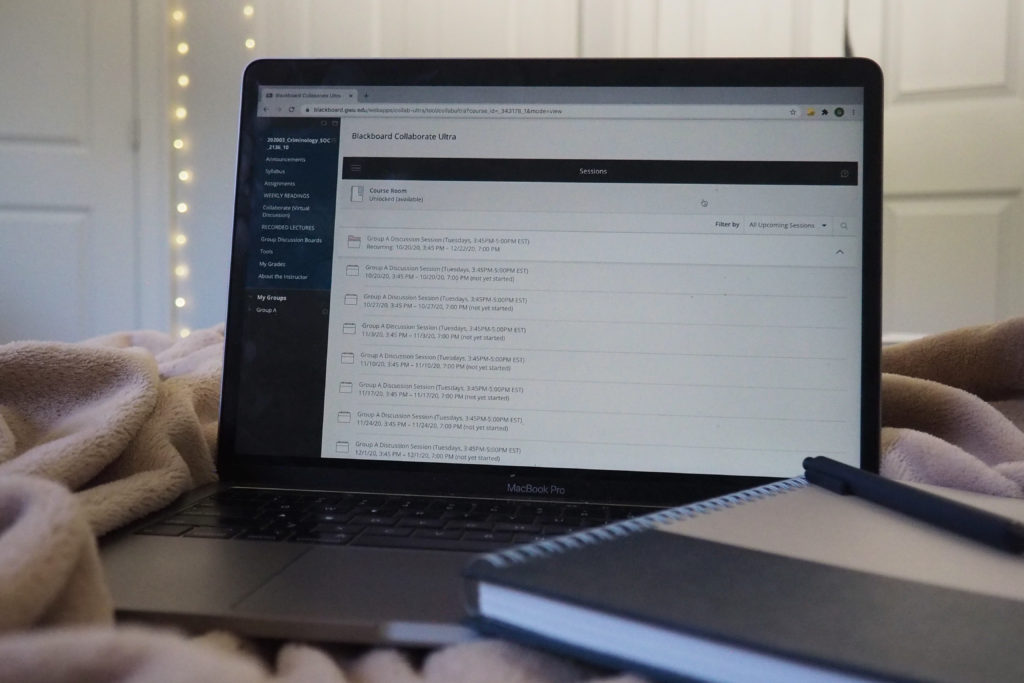Students diagnosed with COVID-19 this semester said they have struggled to balance their schoolwork and debilitating symptoms.
Five students who tested positive for the coronavirus in the past two months said watching lectures or completing assignments became increasingly difficult while they experienced symptoms like headaches and fatigue. The students, who spoke anonymously to keep their medical record private, said some professors made accommodations, but they wish officials established a policy requiring academic extensions to help alleviate stress while they recover from the virus.
A junior living in D.C. said he was “annoyed” when he discovered he had contracted the virus indirectly from an off-campus party Delta Tau Delta fraternity members held last month. He said he has been “very cautious” with who he interacted with, and the decision to host a party was “inconsiderate” of other people’s safety.
He said half of his teachers were understanding of his situation and gave him extensions on his assignments, but the other half required his attendance in class. He said a professor told him he would have to complete a make-up assignment if he missed a lecture, but his head and body aches made it difficult to participate and grasp class material.
“I’m already sick – I don’t need to be doing more work if I’m not going to make it to class,” the student said. “I think it was a little inconsiderate compared to what we’re going through.”
He said professors should have a standardized procedure to accommodate students with the virus in their classes. He said he understands professors might feel students cannot “truly get a grasp” of the course material unless they attend, but insisting students complete a makeup assignment upon missing class because they’re sick is “ridiculous.”
“If the University was to standardize a procedure, and if a student did test positive for coronavirus, I do think that it would make communications a lot easier, and they would know the protocol that they’re required to follow,” he said.
A freshman taking classes in Iowa said when she was diagnosed with the virus three weeks ago, she felt like her professors “couldn’t care less” after she told them she was sick. The student said the virus hit her “like a train,” and she was diagnosed with pneumonia soon after testing positive.
The student said she dealt with headaches and a 103-degree fever, but professors offered no mercy and required her usual participation.
“I did get some grades that I look at now, and it’s not a direct reflection of what I could have done if I didn’t have COVID at the time,” she said.
The student said one of her professors unexpectedly announced to the class of about 50 students that she had the coronavirus, which she had not asked them to do. She said she laughed it off at the time, but the professor’s announcement embarrassed her.
She said another professor required her to take an exam the day she joined the class, even after telling them she was struggling to manage her symptoms and catch up with the material she missed. She said the professor told her not to worry about feeling unprepared because students are allowed to drop their lowest exam grade at the end of the semester, but she would have preferred an extension to study.
The student added that officials should have implemented a policy when the University shut down in March, giving students extra accommodations and leeway to complete assignments if they became sick.
“If a student has COVID and they ask, ‘Hey, are there some accommodations you can make?’ don’t be rude about it,” she said.
A sophomore living in an off-campus apartment said she and her roommates tested positive for the virus in late September. She said she was “pleasantly surprised” with the attentive care she received from Colonial Health Care physicians after she received her positive test result at the Smith Center.
Officials expanded GW’s in-house testing in late September to include off-campus students if they show symptoms of COVID-19 or believe they have been exposed to the virus.
“The GW doctor reached out to me and my roommates at least three times each and was super helpful,” she said. “One time I had a question, so I called her and she immediately picked up the phone. I was honestly surprised in a good way how helpful the doctor was.”
She said she only told one of her professors she had tested positive for the virus because she did not have other assignments due that week and said the professor was “really understanding” and granted her an assignment extension. She said she felt fatigue and lost her sense of taste and smell, but the worst part was being away from her family.
“I feel like no matter how old you are, when you’re sick, it’s just more comfortable to be with your family,” she said.
A sophomore living in D.C. said her professors were all “extremely understanding” and offered her extensions on assignments when she told them she tested positive in late September. She said she experienced symptoms for about a week with headaches, body aches, a fever and a cough but said fatigue made it most difficult to pay attention to class.
“Being exhausted definitely had a large impact on it, but I think that having understanding professors definitely made a huge difference,” she said.








